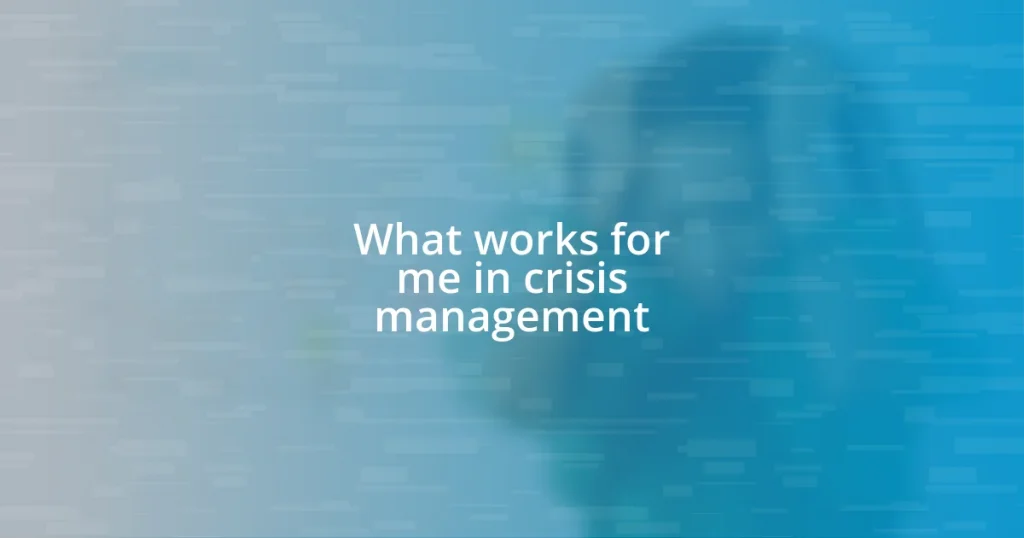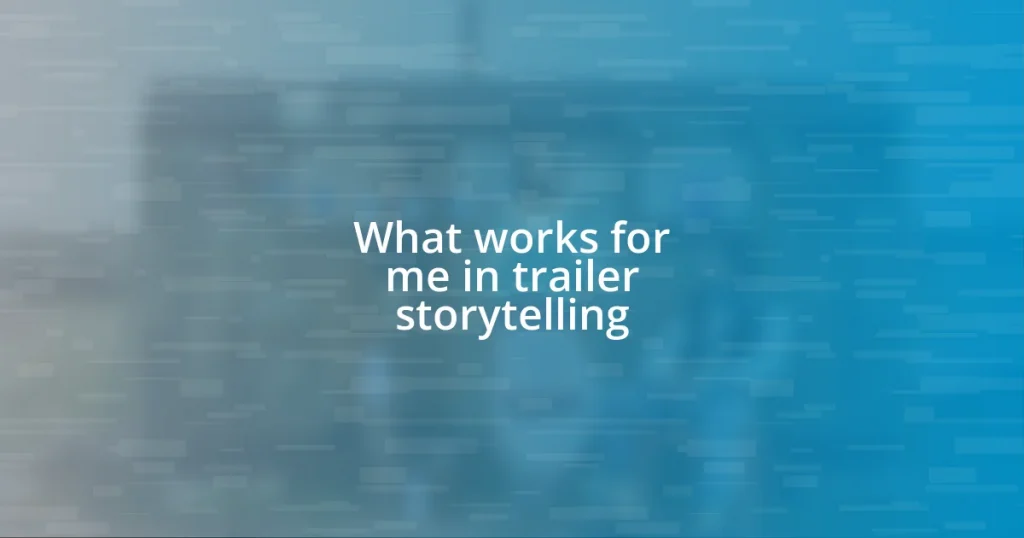Key takeaways:
- Preparation and effective communication are essential in crisis management, enabling teams to stay united and resilient during tough times.
- Recognizing personal strengths, such as resilience and teamwork, can enhance problem-solving and motivate collaboration in crises.
- Learning from past experiences, through reflection and documentation, helps in developing better strategies for future challenges and fosters a culture of continuous improvement.
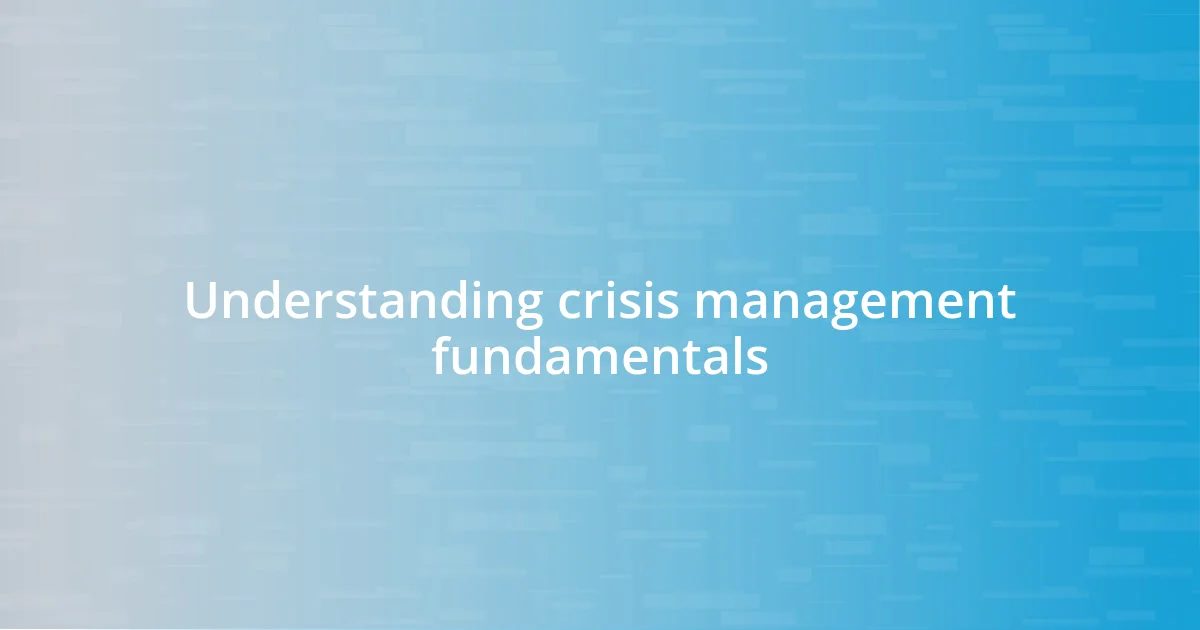
Understanding crisis management fundamentals
Crisis management is all about preparation and response. I recall a time when I faced a sudden upheaval in a project due to external factors. It struck me how essential it was to not only have a contingency plan but to be mentally prepared to adapt swiftly to changing circumstances.
Understanding the fundamentals also involves acknowledging the various types of crises that can arise. Whether environmental, financial, or reputational, each requires a tailored response. Have you ever considered how your emotions might interfere with making rational decisions in a crisis? I certainly have; recognizing that fear can cloud judgment made me sharper and more proactive in addressing challenges head-on.
Effective communication is another cornerstone of crisis management. Sharing transparent updates with your team can foster trust, even in chaotic times. During one particularly stressful incident, a simple morning briefing changed the atmosphere entirely. Suddenly, everyone felt more united. Isn’t it fascinating how clear communication can steer a team toward resilience?
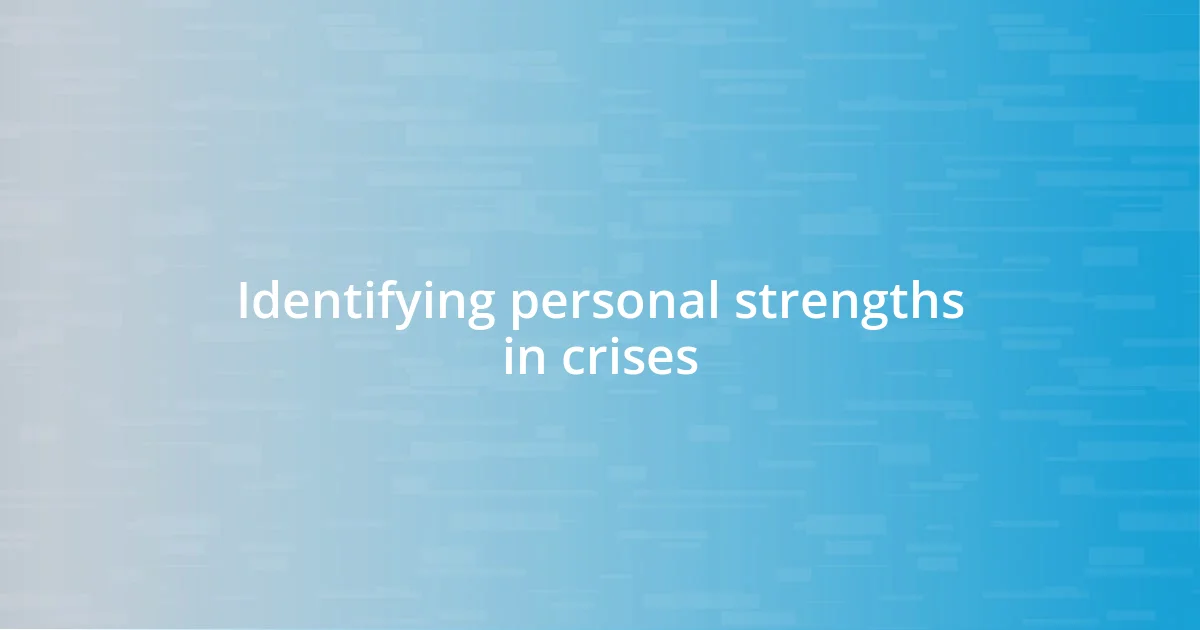
Identifying personal strengths in crises
Recognizing personal strengths during a crisis can be transformative. For me, introspection helps highlight qualities like resilience and adaptability. I remember a situation where a sudden deadline change threatened to derail my entire project. It was in that moment of panic that I realized my ability to stay calm under pressure allowed me to formulate an action plan swiftly, showcasing a strength I didn’t fully appreciate before.
It’s essential to reflect on your reactions in difficult situations. When I encounter a crisis, my inclination to analyze problems from multiple angles often surfaces. This analytical strength allows me to identify practical solutions, even when stress is at its peak. For example, during a critical incident at work, I adopted a step-by-step approach to tackle issues, breaking them down into manageable parts, which not only eased my anxiety but also motivated my team to follow suit.
Equally important is the power of collaboration. I’ve noticed that my strengths in fostering teamwork shine brighter in crises. One memorable experience was when I rallied colleagues during a system outage. By tapping into everyone’s strengths, we devised a comprehensive response plan together. This collective effort not only resolved the crisis but also reinforced my belief that recognizing each person’s potential can create synergy and drive solutions in turbulent times.
| Identification Method | Personal Strengths |
|---|---|
| Introspection | Resilience |
| Reflection on Reactions | Analytical Thinking |
| Collaboration | Team Building Skills |
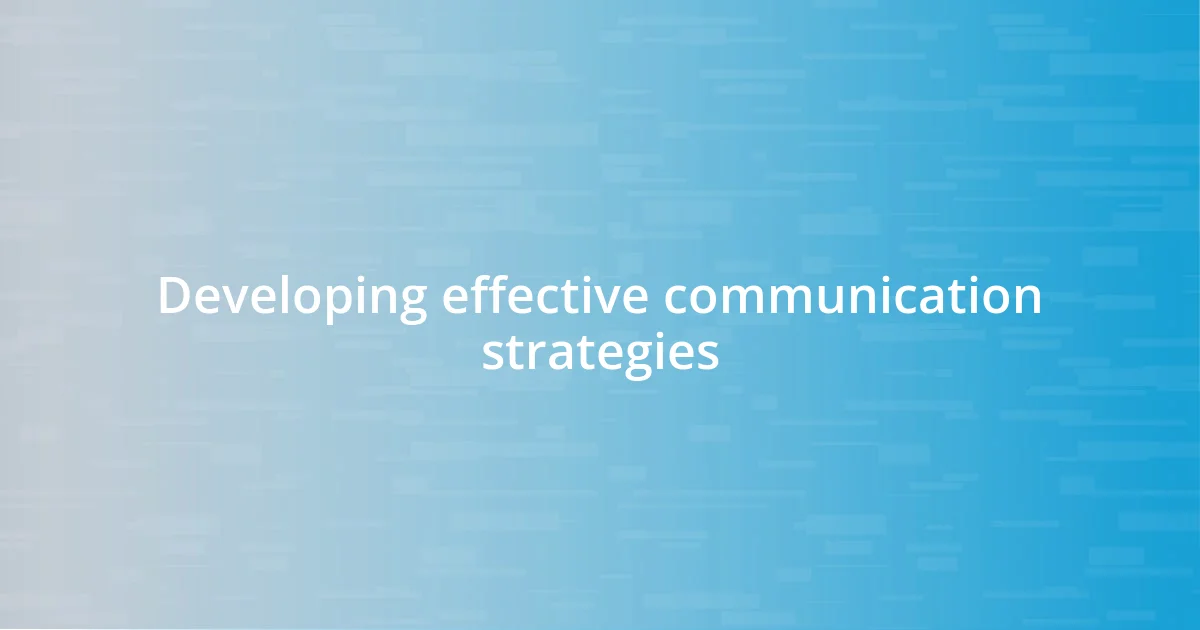
Developing effective communication strategies
When developing effective communication strategies in crisis management, clarity and frequency are vital. I remember a time during a company-wide disruption when our communication felt like a constant ebb and flow. Initially, updates came sporadically, leading to confusion and anxiety. However, once we established regular check-ins, the relief among staff was palpable. They appreciated knowing they were kept in the loop, regardless of the situation’s volatility.
Here are some key points I’ve found helpful in crafting communication during crises:
- Be Transparent: Share what you know, even if it’s not the complete picture. It creates a foundation of trust.
- Establish a Routine: Regular updates can alleviate uncertainty, making team members feel more secure.
- Encourage Feedback: Creating a space for dialogue helps address concerns that might not be visible at first glance.
- Utilize Multiple Channels: Different people absorb information in various ways. Don’t rely solely on emails; consider messages, calls, or even video updates.
- Empathy Matters: Acknowledge the emotional impact on your team. Validating feelings fosters a supportive environment.
In my experience, communication isn’t just about passing messages; it’s about connection. In one particularly difficult situation, our team faced not only operational hurdles but also personal strains. I took the time to check in one-on-one with colleagues, listening to their concerns and fears. This approach not only fostered openness but ultimately bridged the gap in understanding. By ensuring they felt heard, we emerged stronger, united by the knowledge that we could navigate challenges together.
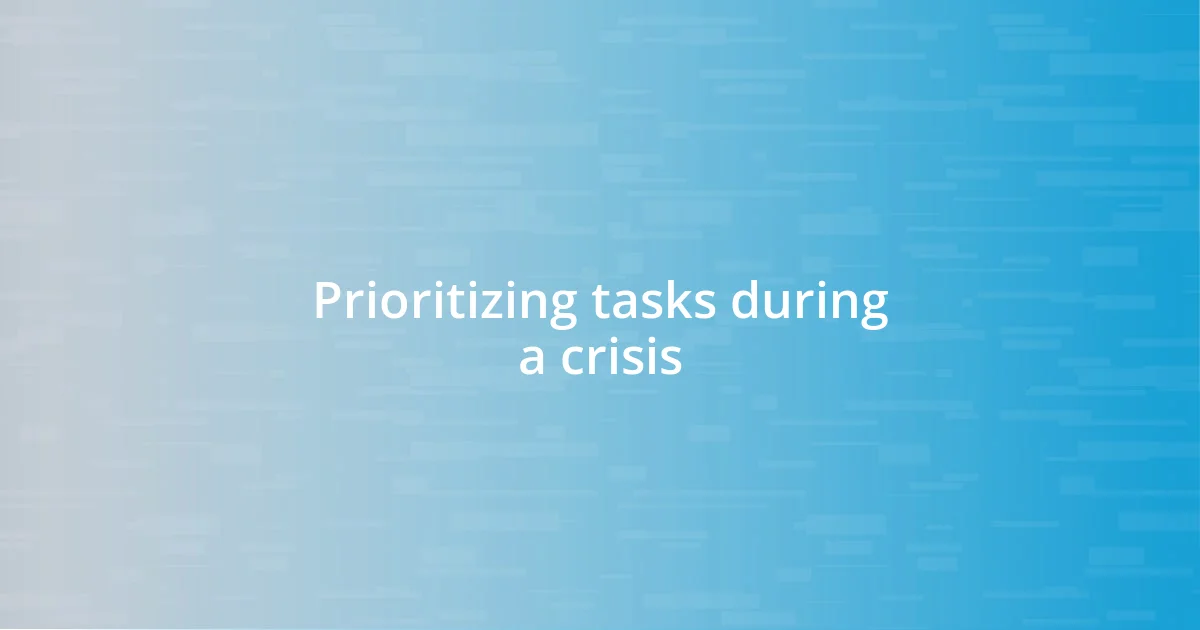
Prioritizing tasks during a crisis
When a crisis strikes, prioritizing tasks becomes paramount, and I often find that creating a clear, action-oriented list helps me stay focused. I recall a time during a significant project setback where I was overwhelmed by the number of issues. Instead of getting lost in the chaos, I took a deep breath and listed out what needed immediate attention. By distinguishing between urgent and important tasks, I could channel my energy into what truly mattered, minimizing wasted effort.
I’ve learned that it’s essential to be adaptable in my prioritization. There was an instance when an unforeseen compliance issue arose just days before a major launch. I had to pivot quickly. By re-evaluating my list and shifting my focus to this urgent matter, I discovered that I could delegate some less critical tasks to my team. Hasn’t it been incredible how teamwork can shift priorities and lighten the load?
Moreover, I’ve found that reflecting on past crises informs my prioritization. For example, during a financial downturn in my organization, I realized that addressing employee morale was as crucial as tackling our budget issues. By prioritizing communication and support alongside financial analysis, we not only navigated the immediate crisis but also fostered a more resilient workplace culture. How can we balance immediate needs with long-term stability? It’s a question I continually ask myself, knowing that effective prioritization is a blend of urgency and foresight.
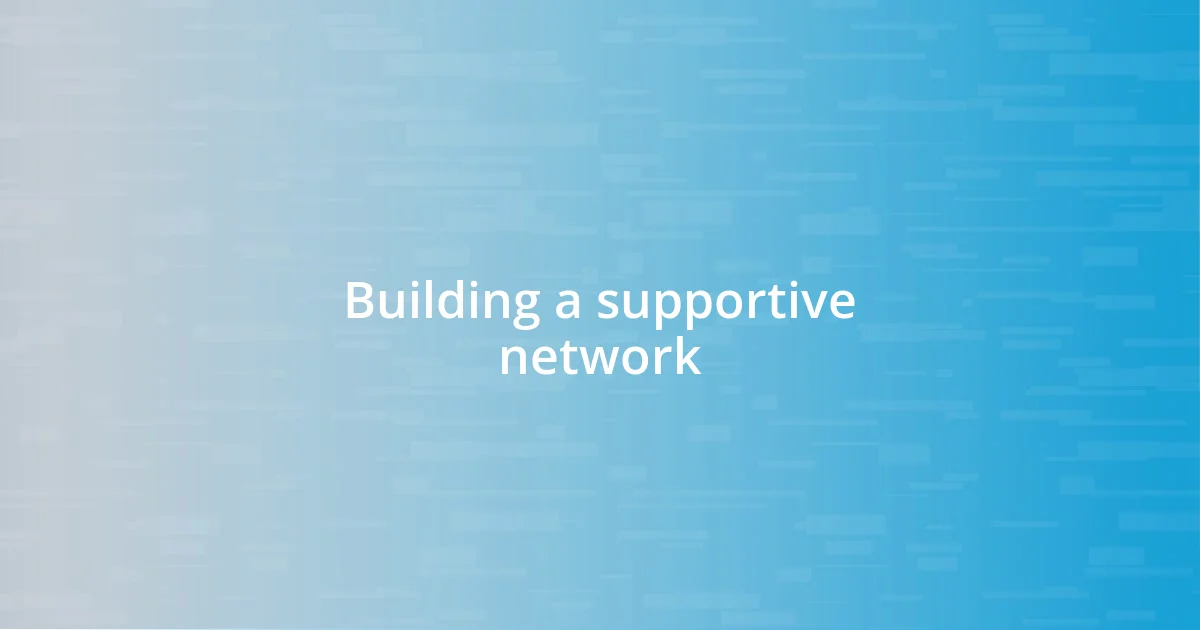
Building a supportive network
Building a supportive network has been essential during challenging times in my career. There was a period when a significant project faced delays, and the stress levels were palpable among the team. I quickly realized that leaning on one another was not just helpful—it was necessary. I organized informal coffee chats where everyone could share their thoughts and feelings. Seeing my colleagues support each other, offering both professional advice and emotional comfort, made a world of difference. Have you ever experienced a moment where camaraderie turned a tough situation around?
Establishing connections before a crisis hits is something I’ve found invaluable. In my experience, fostering relationships with colleagues creates an environment where we can lean on each other when the going gets tough. I remember a time when a sudden market fluctuation caught us off guard. Thanks to existing bonds, we quickly convened to strategize and voice our concerns. The trust built over time enabled us to be open and honest, which proved crucial in navigating the tumultuous waters together. How often do we underestimate the power of having a solid network in place?
Moreover, mutual support can extend beyond immediate colleagues. I often reach out to mentors who have weathered their own storms. Their insights not only help me gain perspective but also inspire resilience. During a particularly chaotic merger, I sought advice from a former manager who had gone through something similar. The strategies he shared guided my approach, and knowing I wasn’t alone in facing challenges lifted my spirits. Isn’t it fascinating how a simple conversation can spark clarity in the midst of chaos? Embracing a supportive network creates a safety net that empowers us to confront crises with confidence.

Learning from past experiences
Learning from past experiences has been a transformative part of my approach to crisis management. I vividly remember a project where I encountered several unforeseen obstacles, leading to sleepless nights and overwhelming stress. Reflecting on how I handled those moments taught me the importance of documenting each crisis. By keeping a record of what worked and what didn’t, I created a personalized playbook that I could rely on in future situations. How often do we overlook the lessons from our challenges?
During another critical juncture, I faced a situation where poor communication nearly derailed a major initiative. After that experience, I realized that revisiting those missteps was invaluable. I began holding debrief sessions with my team after every significant event. This practice not only identified areas for improvement but also fostered a culture of transparency and learning. Hasn’t it been enlightening to see how openly discussing failures can lead to exciting breakthroughs?
Moreover, I’ve discovered that internalizing these lessons enhances my resilience. For instance, after experiencing a particularly tough client negotiation, I used that experience to develop better strategies for future engagements. This process taught me to view setbacks not as dead ends but as stepping stones for growth. How has reflecting on your own experiences shaped your outlook on future challenges? Each time I face a new crisis, I carry the weight of my past lessons with me, allowing them to guide my decisions with more clarity and confidence.











